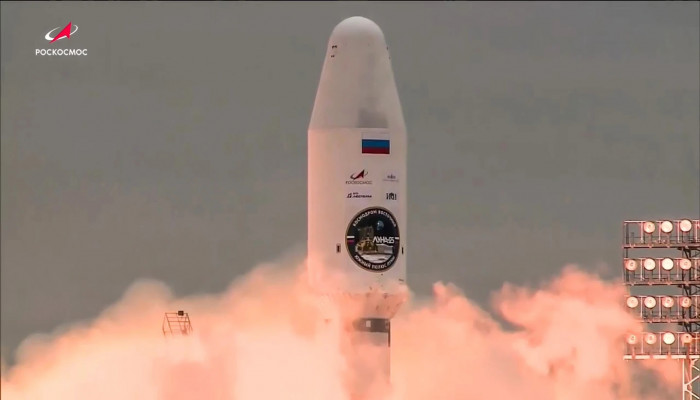Russia launches first moon mission in nearly 50 years
- In Reports
- 11:32 AM, Aug 11, 2023
- Myind Staff
A rocket carrying a lunar landing craft blasted off Friday on Russia's first moon mission in nearly 50 years, a mission designed to give fresh impetus to its space sector, which has been struggling for years and become isolated by the conflict in Ukraine. The launch from Russia's spaceport in the Far East of the Luna-25 craft to the moon is Russia's first since 1976 when it was part of the Soviet Union.
The rocket with the Luna-25 probe lifted off at 02:10 am Moscow time (2310 GMT Thursday) from the Vostochny Cosmodrome, according to live images broadcast by the Russian space agency Roscosmos. The Luna-25 spacecraft was launched using a Soyuz rocket.
With this launch, Russia is hoping to be the first country to achieve a soft landing on the moon's south pole. The Russian lunar lander is expected to reach the moon on Aug 23, about the same day as an Indian spacecraft Chandrayaan 3 which was launched on July 14.
"The launch was successful," said Yuri Borisov, head of Russia's space agency Roscosmos.
The spacecraft is due to reach lunar orbit in five days. It will then spend between three to seven days choosing the right spot before landing in the lunar south pole area.
"For the first time in history, the lunar landing will take place on the lunar south pole. Until now, everyone has been landing in the equatorial zone," senior Roscosmos official Alexander Blokhin said in a recent interview.
Only three governments have managed successful moon landings: the Soviet Union, the United States and China. India and Russia are aiming to be the first to land at the moon’s south pole.
The spacecraft, which will remain on the moon for a year, will be tasked with "taking (samples) and analyzing the soil" as well as "conducting long-term scientific research", the Russian space agency said.
There, it will search for frozen water by taking rock samples from a depth of up to 15 cm (6 inches) of the moon's regolith, the layer of loose surface material.
The craft also carries a dust monitor wide-angle ionic energy-mass analyzer that will provide measurements of ion parameters in the moon's exosphere.
"From the point of view of science, the most important task, to put it simply, is to land where no one else has landed," said Maxim Litvak, head of the planning group for the Luna-25 scientific equipment.
"There are signs of ice in the soil of the Luna-25 landing area, this can be seen from the data from orbit," he added.
Russia's space programme is hampered by sanctions put in place after it invaded Ukraine and made it more difficult for it to use Western technology. Analysts claim that the small moon rover that the Luna-25 was originally intended to carry was dropped in favour of a lighter, more reliable craft.
“Foreign electronics are lighter, domestic electronics are heavier,” Vitaliy Egorov, a popular Russian space analyst, said. “While scientists might have the task of studying lunar water, for Roscosmos, the main task is simply to land on the moon, to recover lost Soviet expertise, and learn how to perform this task in a new era.”
Journalist Daniel Hawkins said that, for Russia, the mission was a “big comeback to major space missions after quite a long break”.
“Everyone is well aware of the tremendous Soviet legacy in terms of space launches,” Hawkins stated.
“After the Soviet Union collapsed and sent the last probe to the moon back in 1976, the Russian space institute really went into a period of decline,” he said.
For Russia, a successful mission to the Moon would show that despite its turbulent past and the Western sanctions, which have “really impacted Russia’s space development”, the country is capable of conducting major space missions, Hawkins said.
It would show that it can do so with “equipment that is effectively made in Russia – Russia’s own brand – to compete at an international level”, he said.
Russia’s most recent space landing missions in 2016 and 2011 ended up failing.
Roscosmos, Russia’s space agency, said it wants to show Russia “is a state capable of delivering a payload to the moon,” and “ensure Russia’s guaranteed access to the moon’s surface.”
“Study of the moon is not the goal,” said Vitaly Egorov, a popular Russian space analyst. “The goal is political competition between two superpowers — China and the USA — and a number of other countries which also want to claim the title of space superpower.”
Image source: AP







Comments